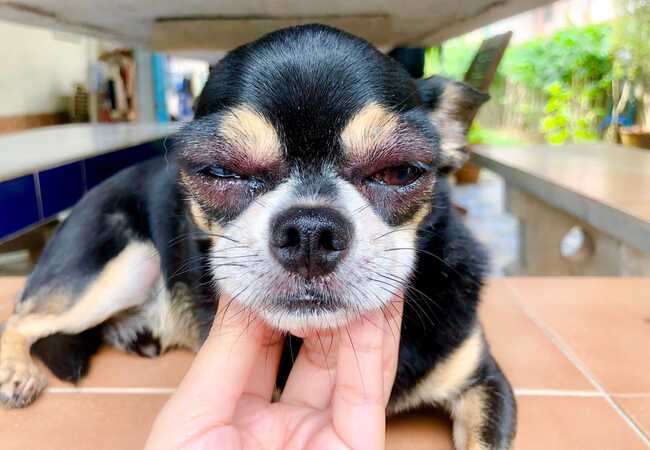Why Your Dog’s Face Is Swollen: Veterinary Guide & Care 2025 🩺🐾

In this article
Why Your Dog’s Face Is Swollen: Veterinary Guide & Care 2025 🩺🐾
By Dr. Duncan Houston BVSc
Hi, I’m Dr Duncan Houston BVSc, veterinarian and founder of Ask A Vet. Finding your dog with a puffy muzzle or droopy eyelids can be alarming. Facial swelling isn’t just cosmetic—it can signal allergies, dental disease, infection, trauma, or even tumors. Let’s explore the causes, diagnosis, treatments, and how to support your pup in 2025, with extra help from Ask A Vet. 🐶💙
1. Why Face Swelling Demands Attention 🚨
Swelling results from fluid accumulation or inflammation in the tissues. It can progress rapidly and affect breathing if the throat is involved, turning what seems like a minor puffiness into an emergency.
2. Common Causes of Facial Swelling
2.1 Allergic Reactions (Angioedema)
-
- Presenting with full-face puffiness—particularly eyes, lips, or muzzle—often sudden and itchy.
- Triggered by bee/insect stings, medications, vaccines, foods, plants, pesticides.
- Can escalate to hives, breathing distress, and collapse, requiring immediate veterinary care.
2.2 Dental Disease & Tooth Root Abscesses
-
- Infected tooth or gum abscesses cause firm, painful swelling—often under an eye or jaw.
- May lead to draining tracts, bad breath, drooling, and loss of appetite.
2.3 Trauma or Bite Wounds
-
- Facial swelling from bites, scratches, and blunt impact—may result in abscesses.
- Snake bites often include swelling and systemic symptoms requiring urgent care.
2.4 Tumors, Masses & Cysts
-
- Oral or facial tumors (benign or malignant) commonly present as localized swelling.
- Cysts and salivary mucoceles may appear as soft lumps under the jaw or near the muzzle.
2.5 Infections: Abscesses & Cellulitis
-
- Bacterial abscesses (often post-traumatic or dental) cause painful, fluid-filled lumps.
- Cellulitis and infections like actinomycosis lead to firm swelling, fever, and lethargy.
2.6 Edema from Systemic Conditions
System-wide fluid retention, due to low protein, severe infection, or organ disease, may affect face—but typically causes puffiness elsewhere too.
3. Spotting the Signs 📋
-
- Sudden vs gradual: Allergies act fast; infections and tumors grow slower.
- One-sided vs generalized: One area often indicates abscess or tumor; full swelling hints at allergy or systemic issues.
- Watch for drooling, bad breath (dental), eye discharge, lethargy, and breathing changes.
4. Vet Assessment & Diagnostics 🔍
-
- History: Recent stings, trauma, diet change, vaccines, toxins.
- Physical exam: Palpates swelling, and checks oral cavity, eyes, throat, and lymph nodes.
-
Diagnostics:
- X-rays/dental X-rays: dental abscess, fractures, tumors.
- Fine-needle aspirate or biopsy: rules in/out tumors or cysts.
- Ultrasound or CT in advanced/surgical cases.
- Bloodwork: infection markers, organ health, protein levels.
5. Treatment Approaches 🩺
5.1 Allergies & Angioedema
-
- Emergency: IV fluids, oxygen, epinephrine, corticosteroids, antihistamines.
- Tapered steroids/antihistamines afterward; allergy testing for recurrent cases.
- Eliminate triggers, and pre-medicate for known sensitivities.
5.2 Dental Abscesses
-
- Tooth extraction or root canal, drain abscess, antibiotics (e.g., amoxicillin), pain relief.
- Soft diet and oral hygiene to prevent recurrence.
5.3 Trauma & Bite Wounds
-
- Clean and flush wounds, prophylactic antibiotics, and drain abscesses.
- Suture/reconstruct if needed; manage pain and inflammation. Snake bites may need anti-venom/supportive care.
5.4 Tumors & Cysts
-
- Benign: surgical removal.
- Malignant: staging, surgical excision, chemotherapy or radiation as needed.
- Cysts: drain or excise associated salivary gland.
5.5 Infections & Abscesses
-
- Drain infection, culture fluid, and antibiotics targeted to the pathogen.
- Supportive care: fluids, pain meds, wound management.
- Actinomycosis: long-term penicillin, possible surgery.
6. Recovery & Home Care 🏡
-
- Soft bedding, restricted activity post-surgery.
- Warm compresses reduce pain/swelling (allergies, abscesses).
- Maintain oral hygiene; follow vet schedule for antibiotics/antihistamines.
- Monitor swelling, appetite, and breathing daily.
- Use Purrz to track meds, symptoms, and vet alerts.
7. Prevention Is Key 🛡️
-
- Flea/tick prevention reduces bug bites.
- Keep dogs away from known allergens (plants, chemicals).
- Routine dental care and checkups prevent oral disease.
- Supervise outdoor activities to reduce trauma risk.
- Clean wounds immediately and monitor for signs of infection.
8. Use Ask A Vet, Woopf & Purrz Support
-
- Ask A Vet: Quick teleconsults for suspected reactions, guidance on meds, wound care.
9. When to Consult or Return to Vet 🚑
-
- If swelling worsens, affects breathing, or causes collapse, go immediately.
- Trouble eating/drinking, persistent fever, lethargy.
- Non-resolving dental or soft-tissue swelling beyond 5–7 days.
- Signs of infection: discharge, increasing pain, odor.
- Swelling returns after treatment—follow-up diagnostics needed.
10. Final Thoughts 📝
Facial swelling in your dog is a sign, not a problem itself. Early diagnosis and treatment—whether the cause is allergy, abscess, trauma, infection, tumor, or systemic illness—are essential. In 2025, combining veterinary knowledge with tools like Ask A Vet helps provide timely care and peace of mind. Your pup’s face doesn’t have to tell a scary story—let’s solve it together! 🐾💙
Seeing swelling? Schedule a telehealth checkup at AskAVet.com and start tracking changes with our app today. 🌟


